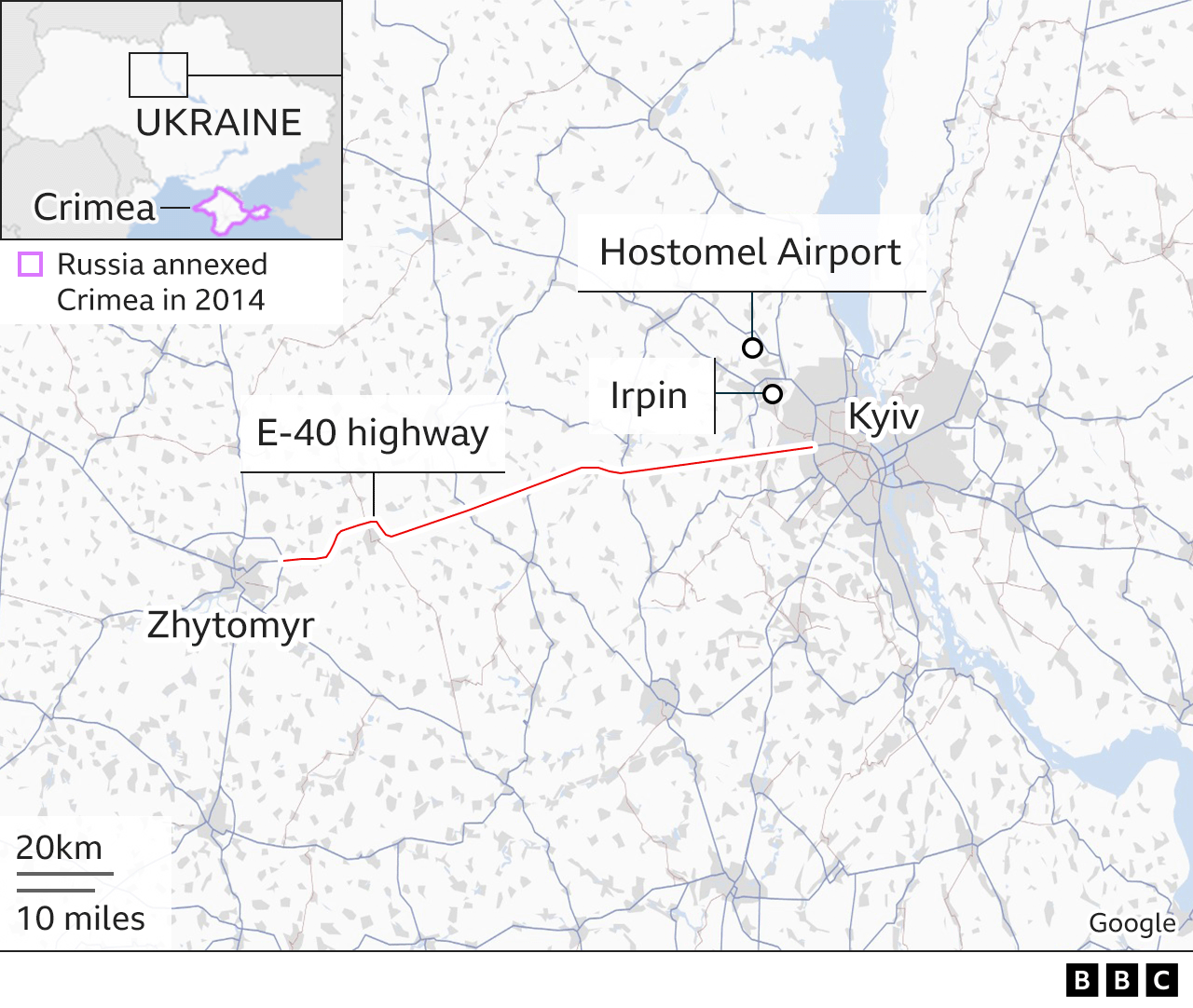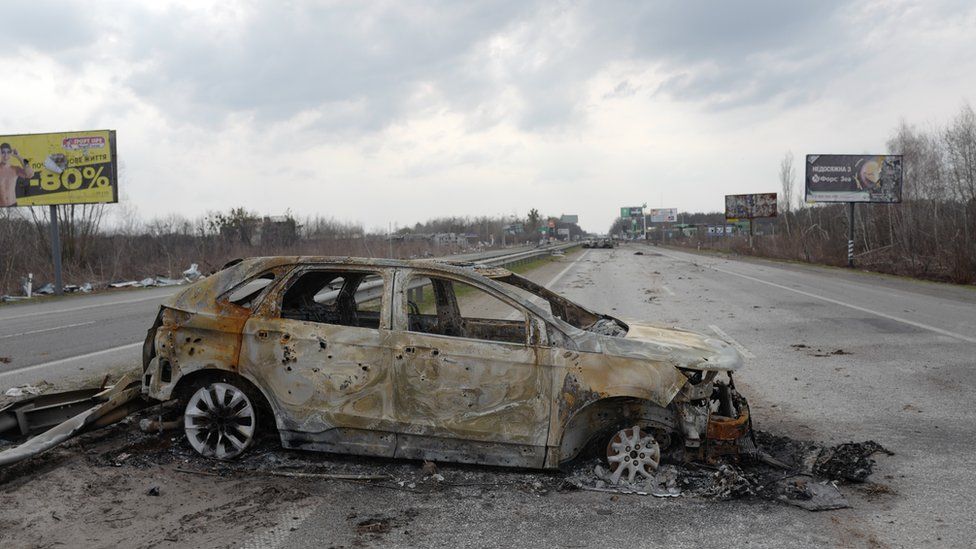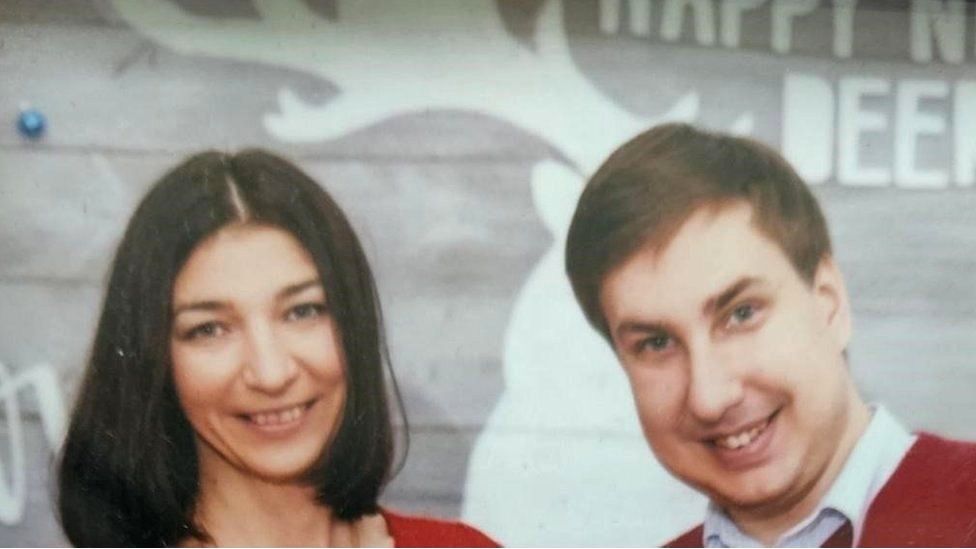The drone footage shows three cars speeding along an empty main road just outside the Ukrainian capital Kyiv, when they suddenly turn around and race back – all except one.
This white car turns, but then stops. A man steps out and raises his hands. Then his body falls to the ground. Moments later, Russian soldiers approach. An elderly woman and child leave the car, and a soldier walks them away.
The man on the ground was Maksim Iovenko. The 31-year-old was shot dead by Russian forces that were positioned at the roadside. His wife Ksenia, who was in the car, was also killed.
Their six-year-old son and the elderly friend of the family who were with them escaped, although she was wounded and remains in hospital. (Both families asked us not to name them.)
“Until I saw the video, I still had some hope,” Maksim’s father Sergiy Iovenko tells the BBC in Kyiv, where he lives. “I was hoping that he was alive.”
When a friend of Maksim’s who was part of the convoy called Sergiy to tell him the news, Sergiy says he immediately knew something was wrong. There was silence when he picked up the phone, and eventually the friend said: “Stay strong, your son and daughter-in-law are gone.”
Maksim lived in Kyiv and worked for a travel agency, which is where he and Ksenia met. Sergiy describes his son as a family man with a kind heart who liked to sing karaoke. But his biggest hobby was his family, he says. “He loved his son very much, and this was his passion.”
Like many other Ukrainians, Sergiy says he and his family didn’t believe Russian President Vladimir Putin would invade. Once Putin did, Maksim thought Kyiv would be one of the first cities to be shelled.
Having discussed the situation with an old school friend, Maksim and his family moved west to the friend’s second home, or dacha, on the outskirts of Kyiv, not far from the E-40 highway where the shooting would happen. Maksim told his father he thought it would be quieter there.
“It turned out the opposite,” Sergiy says.
While Russia’s main focus appeared to be on the east and south of the country, Russian forces also started bombing towns and cities to the west of the capital, such as Irpin, Bucha and Hostomel – close to where Maksim was staying. Sergiy says he would often hear the sound of the heavy bombing from his home in Kyiv.
Maksim wouldn’t say much about conditions at the dacha, Sergiy says. “He would say, ‘it is quiet, peaceful, all is normal.'”
Maksim and his friend, also called Maksim, would take turns patrolling the area overnight, Sergiy says. Power outages and poor mobile signal meant regular contact was difficult. As the bombing continued, they moved into the basement, leaving only to buy food.


Then, on 7 March, they lost all power. With no electricity, heating or food, Maksim, Ksenia and other families staying in the area decided to return to Kyiv. They knew they risked running into Russian troops along the highway, but they thought they could make it through safely.
Maksim’s car was third in the convoy, made up of about 50 people in total, including other children. In the windows of his car, he had put handwritten signs on white paper that read: “Children.” His friend was part of the same convoy, and it was his mother who was in the car with Maksim and Ksenia, and he was able to tell Sergiy what happened.
When the shooting started, Maksim’s car was hit. “The car’s engine stalled,” Sergiy says. “My son jumped out of the car, he raised his hands and started shouting that there was a child in the car, so that the child would be saved.”
It’s not clear why the rest of the convoy fell behind the first three cars, but Sergiy believes many of those driving behind turned back when they saw the cars in front turning and heard the gunshots.
After the shooting, Maksim’s body was left on the highway and Ksenia’s was left in the car. Maksim’s son and his friend’s mother were told by Russian soldiers to walk back along the road. When they got a safe distance from the Russian soldiers, she called her husband, who came to take them to safety. They returned to the dacha, and were evacuated safely to Kyiv the next day.
 IMAGE SOURCE, JEREMY BOWEN
IMAGE SOURCE, JEREMY BOWENThe boy is with his grandmother in a safe location in Ukraine but away from Kyiv, where Sergiy remains.
On Friday, Sergiy received a call informing him that the area had been re-taken by Ukrainian forces. There was more bad news.
“They burned everyone. Burned the cars as well,” Sergiy says.
A team of BBC journalists taken to the same stretch of road saw many burned cars and bodies. Among them was Maksim’s car, riddled with shrapnel and reduced to a shell by fire, with the burned remains of a body inside it and one on the road beside it, still wearing a wedding ring.
Sergiy says he is heartbroken by what has happened, and by what his grandson has had to witness.
The child remembers seeing the Russian soldiers with their weapons and is receiving support from family and specialists, Sergiy says.
“The only words he said when he got to a safe place, to his grannies, were: ‘We won’t be sleeping in a basement any longer, will we? And there won’t be any scary men?'”
Source: BBC News


